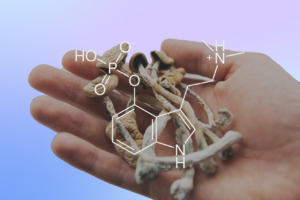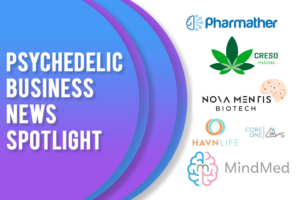
Stuttering is a challenge that can shape a person’s entire life. When support is available, it can be manageable. Without essential support, depending on the severity, it can be ruinous.
A First Glimpse of a Long Road
As we lay underneath his bunk bed reading Fangoria and Starlog magazines aloud by flashlight, over time it became evident that my cousin spoke differently. He struggled with a significant stutter, making everyday communication a source of anxiety and frustration. Often ridiculed by peers, the stutter he was saddled with deepened his self-consciousness and sense of social isolation, and unfortunately I saw him less and less into adolescence. Watching him navigate this relentless struggle left a lasting impression on me. So an article recently published in the journal Frontiers in Human Neuroscience entitled: “Psychedelics In Developmental Stuttering To Modulate Brain Functioning: A New Therapeutic Perspective?” discussing psychedelics as a potential treatment for developmental stuttering (DS), piqued my interest.
The Science Behind Developmental Stuttering – DS
Developmental stuttering is a speech-motor disorder that encompasses numerous sub-types and symptoms, making the condition extremely complex and difficult to treat. Our understanding of the neurological processes behind stuttering remains incomplete, yet it is clear that the condition involves an array of brain mechanisms. Traditional approaches to managing stuttering include a mix of speech therapy, cognitive-behavioral therapy (CBT), and in some cases, medication. While these treatments can be effective, they do not work for everyone, and their success often varies from person to person.
Lots of children will participate in some sort of speech therapy, not all of them struggling with a stutter. Different therapeutic techniques focus on improving speech fluency through various efforts such as controlled breathing, gradual exposure to speaking situations, and practicing speech patterns. CBT, on the other hand, targets the anxiety and negative thought patterns that often accompany stuttering. Both methods emphasize the psychological aspect of stuttering, recognizing that anxiety and self-consciousness can exacerbate the condition. My cousin, for instance, eventually found some relief through speech therapy, which helped him gain better control over his speech. However, the social anxiety he developed from being teased persisted, illustrating the need for more holistic approaches. At that time, there wasn’t nearly the amount of understanding we have today of the interconnectedness of systems and symptoms.
One Thing Leads To Another – The Psychedelic Link
Recent interest in psychedelics as a potential treatment for DS adds a new dimension to these traditional methods. We know that psychedelics like LSD and magic mushrooms have shown promise in treating mental health issues such as depression, anxiety, and PTSD. Researchers speculate that these drugs may also help in treating DS by restoring neural balance and enhancing brain plasticity. The hypothesis is that psychedelics could help prevent the dysregulation of speech-motor networks caused by anxiety—a common trait among people who stutter.
Studies have indicated that social anxiety is highly prevalent among individuals with DS and can significantly worsen speech-motor performance and fluency. Psychedelics’ ability to alleviate anxiety and depression could, therefore, play a crucial role in improving speech control. Recent research also points to the amygdala—a brain region involved in fear and emotional regulation—as being overactive in people who stutter. Psychedelics are known to reduce over-activity in the amygdala, further supporting their potential as therapeutic agents for DS.
Despite promising arguments, it’s essential to note that there have been no formal studies on the use of psychedelics for stuttering. Any existing current evidence is largely anecdotal, yet compelling.
Exhibit A – Proven Therapeutic Modalities
While the potential of psychedelics in treating DS is intriguing yet exceedingly nascent, it is crucial to explore both psychological and physiological practices that may assist with stuttering. Psychological practices like mindfulness and relaxation techniques can help individuals manage the stress and anxiety associated with stuttering. Mindfulness, for example, teaches individuals to stay present and reduce negative thoughts, which can alleviate the pressure and anxiety that worsen stuttering episodes. It is our hope that in a forthcoming edition of the PS livestream THE BODY WORKSHOP that we’ll be able to touch on DS and any positive anecdotal reporting to share.
On the physiological side, practices such as diaphragmatic breathing and vocal exercises can help improve speech fluency. Diaphragmatic breathing, which involves deep breathing from the diaphragm rather than the chest, can help regulate breathing patterns during speech, making it smoother and more controlled. Vocal exercises, meanwhile, strengthen the muscles involved in speech production, enhancing overall speech fluency.
Drawing parallels between these methods and the psychedelic experience can reveal some interesting insights. Both mindfulness alone, and intentional psychedelic use emphasize being present and breaking free from habitual thought patterns, which can reduce anxiety and promote more adaptive behaviors. Similarly, the physiological benefits of controlled breathing and vocal exercises can be seen in the way psychedelics might help to recalibrate brain activity and promote neural plasticity, leading to better speech control.
The Shape of Speech to Come
Traditional methods, tried and true like speech therapy and CBT may offer valuable tools for managing stuttering. The potential of psychedelics as a treatment for DS presents an exciting new frontier, as they do for so many other psychological/physiological challenges.
My cousin was the first person I met with a prominent stutter, and I’m proud to report that it was something he was able to get a handle on over time with hard work and the support of his family. As researchers continue to explore the possibilities of psychedelics for their vast healing potential, it’s exciting to envision a holistic approach that combines all of the powerful technologies we have at our disposal to provide comprehensive support for those who stutter.





